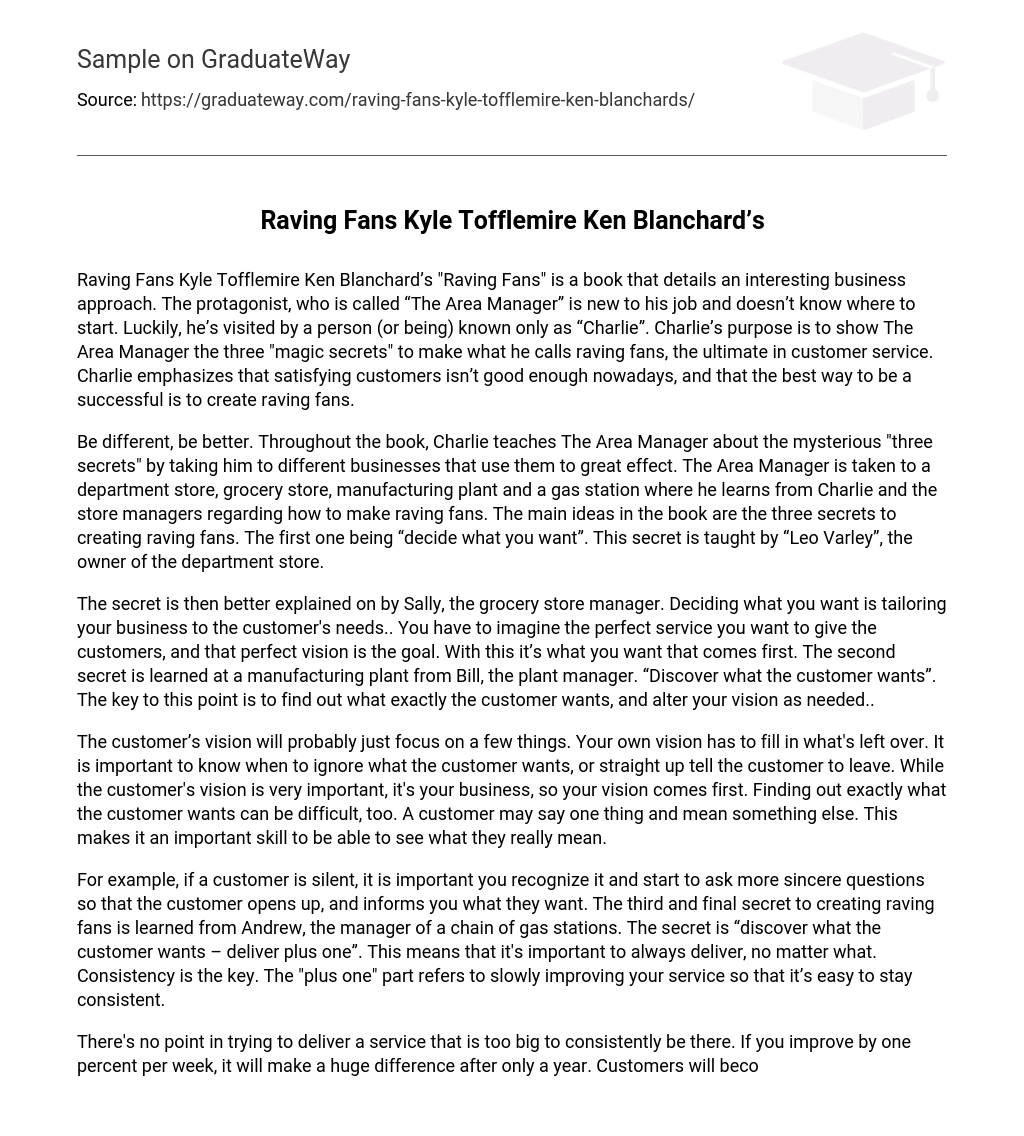Raving Fans Kyle Tofflemire Ken Blanchard’s “Raving Fans” is a book that details an interesting business approach. The protagonist, who is called “The Area Manager” is new to his job and doesn’t know where to start. Luckily, he’s visited by a person (or being) known only as “Charlie”. Charlie’s purpose is to show The Area Manager the three “magic secrets” to make what he calls raving fans, the ultimate in customer service. Charlie emphasizes that satisfying customers isn’t good enough nowadays, and that the best way to be a successful is to create raving fans.
Be different, be better. Throughout the book, Charlie teaches The Area Manager about the mysterious “three secrets” by taking him to different businesses that use them to great effect. The Area Manager is taken to a department store, grocery store, manufacturing plant and a gas station where he learns from Charlie and the store managers regarding how to make raving fans. The main ideas in the book are the three secrets to creating raving fans. The first one being “decide what you want”. This secret is taught by “Leo Varley”, the owner of the department store.
The secret is then better explained on by Sally, the grocery store manager. Deciding what you want is tailoring your business to the customer’s needs.. You have to imagine the perfect service you want to give the customers, and that perfect vision is the goal. With this it’s what you want that comes first. The second secret is learned at a manufacturing plant from Bill, the plant manager. “Discover what the customer wants”. The key to this point is to find out what exactly the customer wants, and alter your vision as needed..
The customer’s vision will probably just focus on a few things. Your own vision has to fill in what’s left over. It is important to know when to ignore what the customer wants, or straight up tell the customer to leave. While the customer’s vision is very important, it’s your business, so your vision comes first. Finding out exactly what the customer wants can be difficult, too. A customer may say one thing and mean something else. This makes it an important skill to be able to see what they really mean.
For example, if a customer is silent, it is important you recognize it and start to ask more sincere questions so that the customer opens up, and informs you what they want. The third and final secret to creating raving fans is learned from Andrew, the manager of a chain of gas stations. The secret is “discover what the customer wants – deliver plus one”. This means that it’s important to always deliver, no matter what. Consistency is the key. The “plus one” part refers to slowly improving your service so that it’s easy to stay consistent.
There’s no point in trying to deliver a service that is too big to consistently be there. If you improve by one percent per week, it will make a huge difference after only a year. Customers will become a raving fan if they know they can come back and count on the same great service. A concept we learned about in Business Leadership that relates to the main point in this book is control systems. We looked at the importance of control in management and learned about various different systems. In this book, systems are shown to greatly help customer service.
Systems are predetermined ways to get a specific result and still ensure consistency. Andrew, the plant manager said “Systems give you a floor, not a ceiling”. Thus, a system is the sort of thing you build on, a starting point. An external control measure, for example, involves motivating employees with incentives, and a motivated employee is a good employee. Compensation methods, such as bonus pay, or commission, can help to motivate, which will lead to better customer service. Looking after your employees is very important as well, regarding customer service.
An unhappy employee is less likely to treat a customer the way you would like them to, and may give a bad impression of your company. If you appreciate your employees, and show them this through rewards, they will treat the customer well, and you’ll have a raving fan. The book stresses the importance of differentiating yourself from your competition. When you exceed the customer’s expectations, you catch their notice. Knowing how effective it can be, I believe it may be a good idea to use this every day.
The concept can be applied to other aspects of life, after all. For example, when applying for a job, one might check up routinely on their applications, and make small talk with the employees, rather than just dropping off their paper and playing the waiting game. In the future, when dealing with potential employers, and, hopefully, customers, I will keep in mind the three secrets to creating raving fans.





